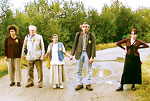As the family travels through Central Europe, they revisit the childhood haunts and wartime locations of Irena's grandmother Tonia. In addition to the horror, Tonia tells of family and friendships and the “little” acts of love that kept her alive—what can be called the woman's side of war. Autobiographical, the family includes the filmmakers, Doniphan and Nicholas Blair (the entire production team), Nick’s worrywart wife, Tania, and their joke-cracking gentile father, Vachel, as well as their survivor mother, Tonia, and Irena, Doniphan’s daughter. Arriving from New York City to Tonia's hometown of Lodz, Poland, they are immediately confronted by neo-Nazi graffiti, local drunks and her eye-witness accounts — filmed exactly where the events described occurred — but it is not all one big bummer. They also enjoy goofing around and Tonia’s stories of childhood. Researching a wartime era clue, they find a friendly Polish mayor and locate where their Polish family was murdered. Then they follow Tonia's wartime route, first to Auschwitz, where the film artfully evokes the death camp experience (assisted by Moses Sedler’s poignant music), then to camps in Germany and Austria. Along the way, familial love turns to conflict when Doniphan asks the family to wear Jewish stars and march through a German town. Irena refuses but she comes to her own understanding later. In another one of the film’s performance pieces, to honor the good Samaritans who fed Tonia during the war, the family gives away bread in the Czech Republic. Indeed, the film's climax is when Tonia remembers flirting with a decent German officer—an emotional exchange that proved even more uplifting then food. And the film concludes on this theme, kindness as an existential counter force to atrocity.

